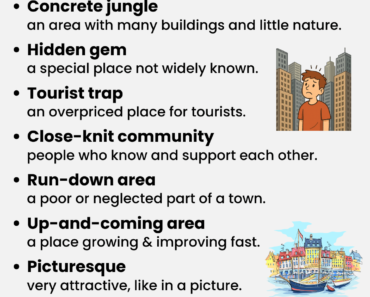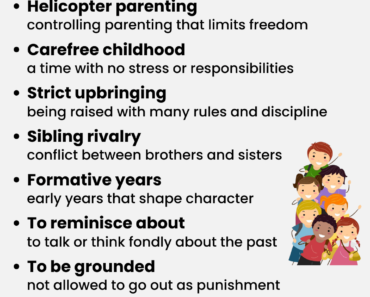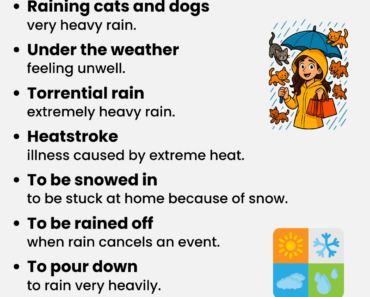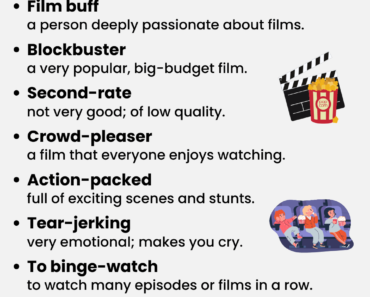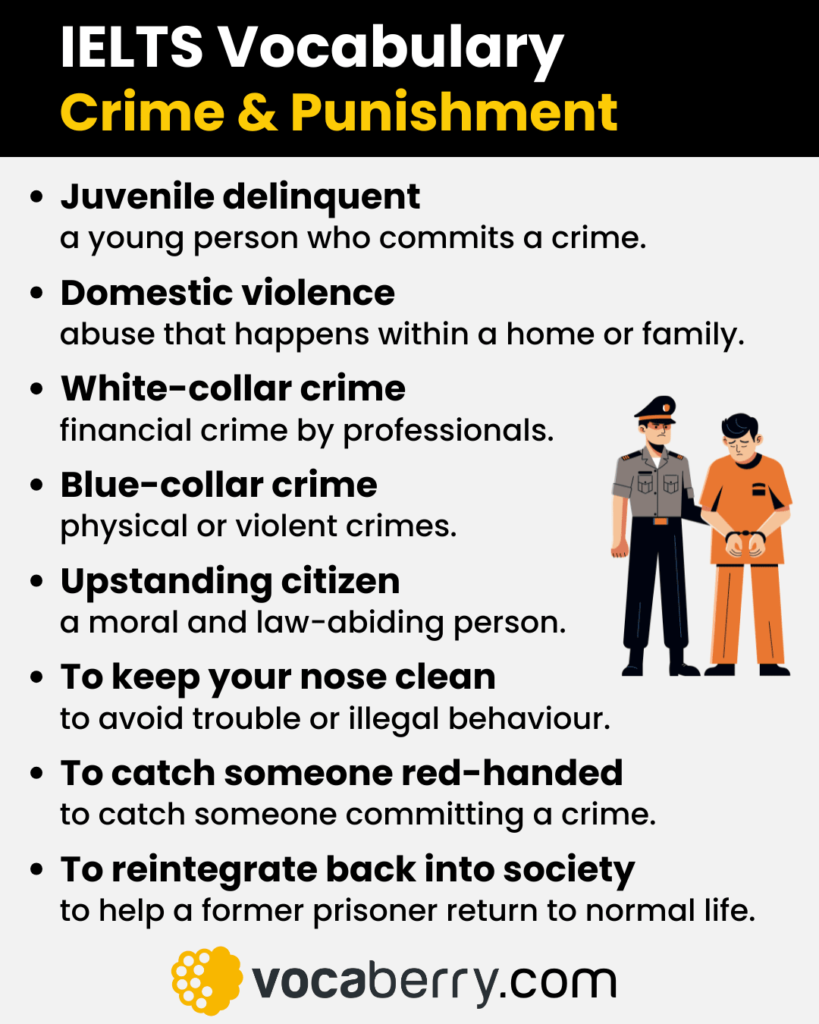
Crime and punishment is a common topic in the IELTS Speaking test. Examiners may ask you about crime rates, types of punishment, reasons people commit crimes, or how crime affects society. In this guide, you’ll learn useful IELTS vocabulary for crime and punishment with clear definitions, followed by IELTS Speaking Part 1, Part 2, and Part 3 questions with sample answers.
IELTS Vocabulary for Crime and Punishment
Here is some useful IELTS vocabulary for talking about crime and punishment with clear definitions. These words and phrases will help you give better answers in the IELTS Speaking test.
- Crime rate – the number of crimes committed in a particular area.
- Repeat offender – someone who commits crimes more than once.
- Law-abiding citizen – a person who always follows the law.
- Upstanding citizen – a person who behaves morally and follows the law.
- Juvenile delinquent – a young person who commits a crime.
- First-time offender – someone committing a crime for the first time.
- White-collar crime – financial crimes by professionals, like fraud.
- Blue-collar crime – crimes involving physical force or direct theft.
- Cybercrime – crimes committed online, such as hacking or identity theft.
- Violent crime – crimes that involve physical harm to others.
- Organised crime – illegal activities run by large criminal groups.
- Petty crime – a small or minor illegal act.
- Serious offence – a major or violent crime.
- Capital offence – a crime punishable by death.
- Criminal record – a list of someone’s past crimes.
- The letter of the law – the exact wording of legal rules.
- Police force – an official group maintaining public order.
- Law enforcement – police and authorities ensuring laws are followed.
- Detective – a police officer who investigates crimes.
- Surveillance – close observation of suspects or places.
- Evidence – facts or objects proving a crime happened.
- Zero-tolerance policy – strict enforcement with no exceptions
- Court case / Trial – a legal process to decide if someone is guilty.
- Verdict – the final decision of the court.
- Appeal – a request to change a court’s decision.
- Death penalty / Capital punishment – execution as punishment for a crime.
- Life imprisonment – spending the rest of your life in prison.
- Non-custodial sentence – punishment not involving prison.
- House arrest – legal confinement to one’s home.
- Community service – unpaid work done as punishment instead of prison.
- Rehabilitation – helping criminals return to normal life after punishment.
- Deterrent – something that discourages crime.
- Justice system – the system of law and courts in a country.
- Punishment should fit the crime – the idea that penalties should be fair.
- Motive – the reason behind committing a crime.
- Crime prevention – steps taken to stop crime from happening.
- Crime wave – a sudden increase in criminal activity.
- Self-defence – protecting yourself from harm.
- Vigilante – a person taking the law into their own hands.
- Domestic violence – abuse that happens within a home or family.
- Vandalism – deliberately damaging public or private property.
- Forgery – making fake documents or signatures.
- Burglary – entering a building illegally to steal.
- Assault – attacking someone physically.
- Murder – unlawfully killing someone.
- Arson – setting fire to property on purpose.
- Fraud – deception for personal gain.
- Shoplifting – stealing items from a store.
- Child abuse – harming or mistreating a child.
- Manslaughter – killing someone without intent.
- Pickpocketing – secretly stealing from someone’s pockets.
- Trespassing – entering private property without permission.
- Embezzlement – stealing money you were trusted to manage.
- Blackmail – threatening to reveal secrets unless demands are met.
- Smuggling – illegally bringing goods or people across borders.
- Human trafficking – illegally transporting people for exploitation.
- Corruption – dishonest or illegal behavior by people in power.
- Crime of passion – a crime caused by sudden strong emotion.
- Prison overcrowding – too many prisoners for a prison’s capacity.
- False imprisonment – holding someone without legal authority.
- Money laundering – hiding the source of illegally earned money.
- Identity theft – using someone else’s personal details illegally.
- Traffic violations – breaking driving laws or road rules.
- Drunk driving – driving under the influence of alcohol.
- To be above the law – to think you are not subject to the law.
- To investigate a case – to examine the details of a crime.
- To be found guilty – to be officially judged as having committed a crime.
- To plead innocent – to claim you are not guilty.
- To be acquitted – to be found not guilty in court.
- To be accused of – to be blamed for committing a crime.
- To be sentenced to – to be officially given a punishment by a court.
- To serve a prison sentence – to spend time in prison as punishment.
- To be behind bars – to be in prison.
- To be released from prison – to be set free after serving a sentence.
- To be on probation – to be monitored instead of serving time in prison.
- To reoffend – to commit another crime after being punished.
- To impose a fine – to order someone to pay money as punishment.
- To breed future offenders – to create conditions that lead to more crime.
- To turn to a career of crime – to choose crime as a way of life.
- To get away with something – to avoid being punished for doing something wrong.
- To face the music – to accept punishment or criticism for your actions.
- To install surveillance cameras – to put cameras in place to monitor for crime.
- To make a fresh start – to begin a new life after past mistakes or crime.
- To be soft on crime – to give light or lenient punishments.
- To be tough on crime – taking strict action to reduce or punish crime.
- To reintegrate back into society – to help former criminals return to normal life.
- To release back into society – to allow a prisoner to rejoin the community.
- To revoke a license – to officially take away legal permission (e.g. to drive).
- To punish wrongdoers – to give penalties to those who break the law.
- To catch somebody red-handed – to catch someone committing a crime.
- To keep your nose clean – to avoid trouble or illegal behaviour.
- To pose a serious threat to society – to be dangerous to the public.
- To take the law into your own hands – to punish someone without legal authority.
- To be charged with a crime – to be officially accused of breaking the law.
IELTS Speaking: Crime and Punishment Questions & Answers
In this section, you’ll find IELTS Speaking Part 1, Part 2, and Part 3 questions on crime and punishment with sample answers. These examples show how the vocabulary can be used in your responses during the test.
IELTS Speaking Part 1 – Crime and Punishment
Do you think people in your country follow the law?
I’d say most people are law-abiding citizens, but of course, there are exceptions. You do hear about traffic violations, or even corruption in high places. Still, the majority try to keep their noses clean.
What kind of crimes do you think are most common in your country?
Probably fraud and shoplifting. Economic problems sometimes push people to commit petty crimes. Sadly, blue-collar crimes like theft and drunk driving also occur quite often.
Do you trust the police in your country?
Generally, yes. The police force is professional and takes its role in law enforcement seriously. But sometimes people feel that upstanding citizens are treated the same as criminals, especially under zero-tolerance policies.
Are there any crimes that really shock you?
Yes, I find child abuse and human trafficking particularly disturbing. They’re not just illegal; they’re morally unacceptable. I think those who commit such acts should never be released back into society.
Have you seen any crimes happening in public?
Once, I saw someone being caught red-handed trying to pickpocket a tourist on the subway. Luckily, the police were nearby and acted quickly. It made me more aware of how common petty crime can be in busy places.
IELTS Speaking Part 2 – Crime and Punishment Cue Card
Describe a crime you heard about in the news.
You should say:
- what the crime was
- where and when it happened
- how you heard about it
- and explain how you felt about it.
Sample Answer:
A crime I heard about recently that really shocked me was a case of human trafficking uncovered in a nearby city. It happened just a few months ago, and I first heard about it through a news report on TV, which was later widely shared online.
The case involved a group of criminals who were part of an organised crime network. They were smuggling people across the border and forcing them into illegal labour. Many victims were young and vulnerable, including minors, and it was heartbreaking to see how they had been manipulated. According to the report, law enforcement had been monitoring the suspects closely through surveillance, and after collecting enough evidence, arrests were finally made.
The suspects were brought to trial, and it turned out that some were repeat offenders with a long criminal record. Eventually, they were found guilty and sentenced to long periods of life imprisonment. I remember feeling a strong sense of relief when I heard the verdict, especially since crimes like this pose a serious threat to society.
What angered me most was how they’d operated for so long without being caught. It made me wonder if the system had been too soft on crime in the past. Thankfully, this time the justice system responded firmly, and I think the punishment fit the crime.
Personally, I believe people involved in such terrible acts should never be released back into society, especially if they show no remorse. Victims of human trafficking and child abuse often suffer for life, and no sentence can undo that damage. This incident reminded me how important law enforcement and surveillance are in crime prevention. It also showed how vital it is for law-abiding citizens to stay alert and report suspicious activity.
IELTS Speaking Part 3 – Crime and Punishment Discussion
IELTS Speaking Part 3 questions about crime and punishment often ask you to discuss the causes of crime, compare forms of punishment, and give opinions on justice, rehabilitation, law enforcement, and the role of legal systems in society.
What kinds of punishments are common in your country?
In my country, the justice system applies various punishments depending on the crime. For serious offences, such as violent crime or murder, offenders may receive life imprisonment. However, for less severe cases, courts often give a non-custodial sentence, such as community service or house arrest, which allows offenders to remain in society while still being punished. For petty crimes, authorities usually impose a fine, which is seen as more practical. I think having different forms of punishment helps ensure that the punishment fits the crime, which is essential for fairness.
Are there any crimes that really shock you?
Yes, crimes like child abuse and human trafficking are particularly disturbing to me. These are not just legal violations but deeply morally unacceptable acts that often destroy lives. What’s worse is that many of these offenders are repeat offenders with a long criminal record, yet they still manage to hurt more people. I strongly believe that those who commit such crimes should not be released back into society, especially if they show no signs of remorse. These cases remind us how crucial strong law enforcement and proper crime prevention measures really are.
Do you think all criminals should go to prison?
Not necessarily. While prison is appropriate for serious offences, I believe alternative punishments can be more effective in some cases. For example, first-time offenders who commit petty crimes might benefit more from rehabilitation or community service. Sending such individuals to prison can sometimes do more harm than good and may even breed future offenders. Also, non-violent criminals could be given a non-custodial sentence, which still holds them accountable without removing them from society entirely. The key is to find a balance between punishment and the chance to make a fresh start.
How can technology help reduce crime?
Technology plays a big role in crime prevention today. For instance, installing surveillance cameras in public spaces can help police monitor criminal activity and act quickly when needed. Data analysis tools can also help law enforcement track patterns and predict where crimes might happen. In the case of cybercrime, advanced software is used to detect identity theft or online fraud. Technology also helps catch criminals. For example, some are caught red-handed through video evidence. Overall, when used properly, technology can support a safer and more secure society.
More IELTS Vocabulary Topics
If you found this lesson useful, explore other IELTS Speaking topics to expand your vocabulary and practice with sample answers:
- IELTS Vocabulary: Accommodation
- IELTS Vocabulary: Advertisement
- IELTS Vocabulary: Animals
- IELTS Vocabulary: Art
- IELTS Vocabulary: Artificial Intelligence
- IELTS Vocabulary: Books
- IELTS Vocabulary: Childhood
- IELTS Vocabulary: Culture and Traditions
- IELTS Vocabulary: Daily Routine
- IELTS Vocabulary: Education
- IELTS Vocabulary: Environment
- IELTS Vocabulary: Family
- IELTS Vocabulary: Fashion and Clothes
- IELTS Vocabulary: Films
- IELTS Vocabulary: Food & Diet
- IELTS Vocabulary: Friends
- IELTS Vocabulary: Gifts
- IELTS Vocabulary: Health
- IELTS Vocabulary: Hobbies
- IELTS Vocabulary: Hometown
- IELTS Vocabulary: Money
- IELTS Vocabulary: Museums
- IELTS Vocabulary: Music
- IELTS Vocabulary: Plants
- IELTS Vocabulary: Shopping
- IELTS Vocabulary: Social Media
- IELTS Vocabulary: Sports
- IELTS Vocabulary: Technology
- IELTS Vocabulary: Transport
- IELTS Vocabulary: Travel
- IELTS Vocabulary: Weather
- IELTS Vocabulary: Work & Jobs



